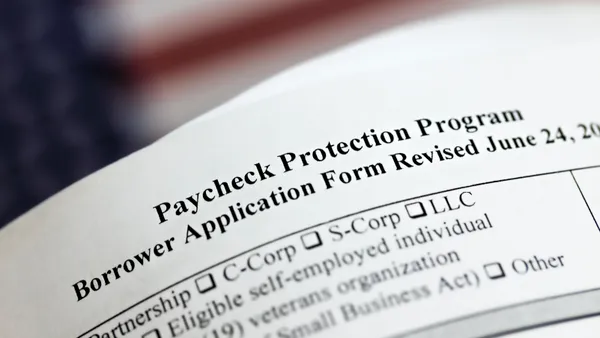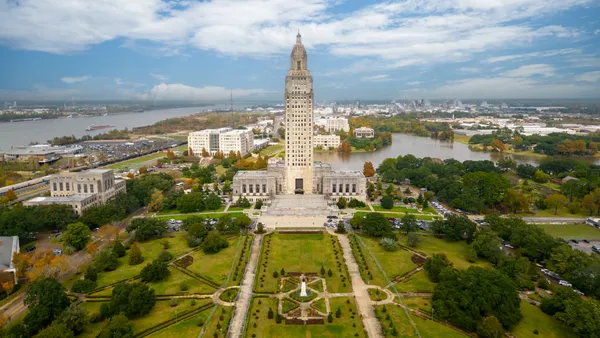UPDATE: March 31, 2021: Bank of America on Tuesday added $250 million — and another year — to its previous four-year, $1 billion racial equality pledge, fueled by a focus to counteract anti-Asian hatred.
“The rising number of attacks against Asian people, including the tragic shootings in Atlanta recently, have served as a stark reminder that we must stand united against discrimination, hate speech and violence,” Thong Nguyen, a vice chairman at the bank, said in a press release Tuesday.
Six of the eight people killed March 16 in a spate of spa shootings in Atlanta were Asian women, and anti-Asian sentiment has arguably seen an upsurge since COVID-19 — first identified in China — spread across the world.
“The urgency we feel to address long-standing issues of inclusion and racial inequality has only increased following the attacks and hate speech directed at Asian people over the last year,” Bank of America CEO Brian Moynihan said Tuesday. “Across the public and private sectors, it is clear that we must do more – to take action, help others convene, and serve as a catalyst for a broad-based, collective response to the critical issues affecting our nation.”
The bank pledged an immediate $1 million to bolster advocacy, dialogue and engagement with the Asian-American community, including a grant to the nonprofit Asian Americans Advancing Justice. Bank of America also named Connie Chung Joe, CEO of the Los Angeles-based arm of the nonprofit, to the bank’s national community advisory council.
UPDATE: July 7, 2020: Royal Bank of Canada is committing 150 million Canadian dollars ($111 million) over the next five years toward racial diversity initiatives, the bank announced Monday. Two-thirds of that total will come in the form of small-business loans to Black entrepreneurs. The remaining amount is meant to create opportunities for 25,000 young people of color.
Canada’s largest lender also aims to increase nonwhite representation among executives to 30% from 20%, but the bank did not attach a timeline to that goal.
People of color account for about 10% of senior executives at Canada’s top six banks, according to Reuters. None has a Black CEO or board member. About 37% of the bank’s Canadian workforce and 35% of its U.S. employees were nonwhite, as of 2019, the wire service reported.
UPDATE: June 30, 2020: Netflix has pledged to allocate 2% of its cash holdings — up to $100 million — to lenders that serve the Black community, the company said in a blog post Tuesday.
The streaming service will shift $25 million into the Black Economic Development Initiative, a new fund that will invest in Black-owned financial institutions serving low-income communities, and $10 million to Hope Credit Union, which has 1.5 million customers in five Southeastern states.
“We are capital-starved, just like the people in the communities we serve,” Hope Credit Union’s CEO, Bill Bynum, told Bloomberg. “Having a global voice like Netflix say it’s important to invest in financial institutions like Hope is tremendously important, not just for the capital we will use to make mortgage loans and small business loans, but for what it says.”
Netflix CEO Reed Hastings earmarked $120 million of his personal wealth to historically Black colleges and universities, Bloomberg reported. But the company hedged toward a solution to combat inequality at a root.
The streaming service is looking to narrow a wealth gap that leaves 19% of Black families with zero or negative assets — a figure that’s more than twice the 9% of white families in the same position, the company said, citing Federal Reserve data. Black-owned or -led banks represent 1% of U.S. commercial banking assets, the company said, citing numbers from the Federal Deposit Insurance Corp.
Despite its pledge, the company has no Black executives among its eight top officers, and added its first Black board member in 2018, according to Bloomberg. Black people account for 7% of Netflix’s employees, up from 4% three years ago. The number of Black vice presidents has tripled to nine in the same time frame, the wire service said.
UPDATE: June 19, 2020: PNC committed more than $1 billion Thursday toward community development financing and capital for neighborhood revitalization and small businesses, among other efforts, to fight systemic racism.
"This is about much more than writing a check," CEO William Demchak said in a press release. "This is about PNC doing what it does well — putting our capital to work in the communities we serve and providing innovation through products and services, with a special focus on helping African Americans buy homes, which we recognize is an important factor in wealth accumulation."
The bank also pledged to show "an intensified focus on the recruitment, retention and advancement of African American talent, a more comprehensive and sustained effort to create a more inclusive culture at PNC and a focus on internal systems to improve racial equality,” Demchak said.
PNC said it will enhance its matching gift program to include support for qualifying nonprofits that back economic empowerment and social justice educational efforts.
The Pittsburgh-based lender is also expanding a program to give employees up to 40 hours of paid time off per year to volunteer in the community for nonprofits that support economic empowerment and social justice.
UPDATE: June 11, 2020: PayPal pledged $530 million to support businesses owned by Blacks and other nonwhites, the company said Thursday.
A half-billion of those dollars will go toward the creation of an economic opportunity fund that will invest in Black and underrepresented businesses and communities, PayPal said, according to an internal memo seen by Reuters. The money will be invested through community banks and credit unions serving nonwhite communities or through direct investments, the company said.
PayPal said an additional $10 million will fund emergency grants to Black-owned U.S. businesses hampered by the coronavirus lockdown. The $10,000 grants will help cover the cost of stabilizing and reopening businesses, said Connie Evans, CEO of the Association for Enterprise Opportunity, which is co-managing the program.
A further $15 million will be used to foster diversity within PayPal by expanding the company’s inclusion programs, Thursday’s statement said.
Six percent of PayPal’s U.S. workforce is Black, according to the company’s 2019 Global Impact Report. But 2% of its technical roles are held by Black employees.
Dive Brief:
-
U.S. Bank pledged June 5 to boost loans to Black-owned businesses by $100 million — one of several initiatives the bank introduced in response to last month's death of George Floyd and the subsequent civil unrest. Floyd, who was Black, was killed by a white police officer May 25 in Minneapolis, where U.S. Bank is based.
-
The company also promised to establish a $15 million fund to award community grants to organizations dedicated to addressing economic and racial inequality. "George Floyd's life had meaning and purpose. We need to do what we can to give the heartbreak that has followed meaning and purpose, as well," Andy Cecere, chairman, president and CEO of U.S. Bank, said in a statement. "If we are truly going to draw strength from diversity, we have to do better. We have to create opportunities that bridge gaps, that generate economic prosperity, and that allow people to achieve their potential."
-
The commitment comes days after Bank of America said it would donate $1 billion over four years to help communities address economic and racial inequality exacerbated by the coronavirus pandemic. The funds will be directed to programs that focus on health, jobs, small businesses and housing in areas with high numbers of nonwhites, the bank said.
Dive Insight:
The bank's new initiatives follow internal comments Cecere made to employees one day after Floyd’s death. He said he expected to be held personally accountable for the bank's "core value of drawing strength from diversity."
"We talk about the importance of diversity, equity and inclusion as a society, but it is hard to say progress is being made when these are the headlines dominating the news," Cecere wrote to employees, according to the Minneapolis Star Tribune. "We have to do better, and I believe we can start right here at the bank."
U.S. Bank said it would also give its employees an extra day of paid time off to volunteer in their communities during the next two months.
The bank said it will also refine its talent management strategy to develop and promote people of color to leadership roles.
"We need to be more intentional about creating conditions in which all of our employees can develop leadership, demonstrate creativity and advance professionally," U.S. Bank's chief diversity officer, Greg Cunningham, said in a statement last week. "We are steadfast in our commitment to placing equal value on the potential contributions, unique leadership skills and creativity that come with the black experience. We are making progress but need to continue to improve in this area."
The bank said it also plans to rebuild branches that were damaged during protests against police brutality, adding that it would break ground as soon as possible on several branches in Lake Street and North Minneapolis — areas of the city that were damaged or burned during riots.
"We chose to serve these communities, and we will not turn our backs or abandon the neighborhoods where so many are hurting right now," Cecere said. "We will continue to provide jobs, banking services and financial education in the areas that have been traumatized during the past week."
The coronavirus prompted banking executives to spotlight inequality in recent weeks. JPMorgan Chase CEO Jamie Dimon said last month that the pandemic should be a "wake-up call." But the national focus on race in the wake of Floyd's death and the resulting protests has spurred some to ponder how to narrow the opportunity gap between whites and people of color.
Bank of America's $1 billion commitment, for example, may include partnerships with historically Black colleges and universities, aid for small nonwhite-owned businesses and hiring in low and moderate-income communities. The effort is also meant to support virus testing and other health services.
Boston-based Berkshire Bank last week hosted virtual town halls with panels to discuss improvements that could be made to bolster Black and Latino-owned businesses.
"When we looked at the wealth gap, we found a couple ways families get on that ladder: home equity, homeownership and business ownership," Malia Lazu, Berkshire's chief culture and experience officer, said last week, according to American Banker. "How do we grow capital in order to support minority businesses, in order to think about homeownership? One leads to the other."
Berkshire worked with the nonprofit Runway Project to launch a Friends and Family loan pilot program to boost entrepreneurship among people of color.
"When COVID hit, I knew that a nationwide Katrina-type catastrophe was about to happen to poor people, to Black people, to brown people," Lazu said. "We needed to start levying dams so we can at least have something to salvage."












